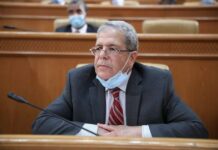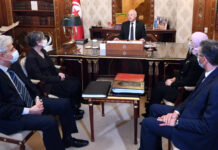Since July 25, 2021, Tunisia has seen a very special turning point. Parliament is frozen, the head of government dismissed and a government that continues to manage without too much conviction, pending the announcement of the identity of the future boss at La Kasbah and his lieutenants, especially in essential sectors (economy, health, finance, trade, security…).
No more Room for Euphoria
It is true that the Tunisians welcomed the initiative of Kaïs Saïed, who “dared”, finally, to neutralize those who were in power and who did everything to bring the country to its knees and completely loot it.
The time for euphoria has passed and citizens have been waiting for more than three weeks for signs of renewal and daring to redress the situation and totally save the country.
And if, on the health side, Tunisia is on a positive curve with increasingly reassuring figures and rates and a respectable vaccination rate, it is the economic field that requires action without hesitation or unnecessary waiting. It is that the evils are known and our experts in the matter have, on numerous occasions, drawn up the picture with its failures, its red dots, its evils and its dangerous repercussions, as well as the urgent actions and decisions which must be taken in the urgency.
Avoid the Dead End
Among these experts, economist Ezzedine Saidane has revealed, since June 2021, that Tunisia needs 12 billion dinars to cover its financial needs, over the next three months (from June to August), in order to ‘avoid the risk of a scenario of inability to repay part of its debts, for the first time in its history He also specified that these funds are divided between the allocation of 4.5 billion dinars to repay loans and the reservation of an envelope of 5 billion dinars for the payment of civil service salaries, as well as a amount of 3 billion dinars to finance general expenses and the compensation fund.
The expert warned that the country is facing serious financial difficulties, in view of the great imbalance between resources and expenditure, while there is only 1,600 million in the state treasury account at the Central Bank of dinars on that date.
He also estimated that the negotiations initiated by the government with the International Monetary Fund (IMF) could not lead to an agreement before three months. Hence the need to find the means to mobilize this envelope of 12 billion dinars, while waiting for the disbursement of the first tranche of the loan to be granted by the IMF, otherwise Tunisia will be obliged to reschedule its debts, and to accept conditions affecting its sovereignty.
For his part, economic expert Moez Joudi also shares the same vision. He would like to recall that La Kasbah, seat of government, is the center from which emanate administrative decisions capable of making life easier for entrepreneurs, hence the urgency of appointing a government. “Even when the administration is functioning, it often falls short of investors’ expectations,” notes the economist. Imagine that on average, it takes 3 months to create a simple limited liability company. It is enormous ! ”
Place for ReformsToday, while the Tunisians are still intoxicated by the promises of Saïed, the hardest is still to come, as the estimated Hichem Elloumi, the vice-president of Utica, who is rather in expectation and does not in no way wishes to give in easily to candid optimism. Elloumi readily acknowledges that the employers “positively” welcomed the decisions of the Head of State of July 25, 2021, but as a good businessman, he remains cautious all the same: “We are awaiting the appointment of a Head of Government. , a government team and the announcement of a roadmap. We expect the publication of a roadmap which will be, of course, mainly political, but it will most certainly be about the economy,” he said.
The return on investment will depend particularly on the degree of visibility and political stability. “The urgent need is to restore confidence and start implementing the major reforms that the business world has been calling for several years.”
All these testimonies and these opinions emanate from recognized experts and we ignore the reasons which prevent the President of the Republic and the members of his cabinet to bring together these eminences in the matter and to discuss and consult to accelerate the development of this famous sheet road that everyone expects.
Other Challenges to Overcome
Hailed by a majority of Tunisians and by a certain economic and trade union establishment, the decisions of July 25 must be followed by real actions capable of loosening the grip on investment. Problem, if the President of the Republic has turned out to be a political end, he is not quite comfortable on economic issues. Appointing a government as quickly as possible with economic competence at its head would be the best way to fill its gaps.
In politics, one should never sleep on one’s laurels and relish victories too much, because there is always to be done and there will always be other, equally important, challenges to overcome.
Rifi-JDD











